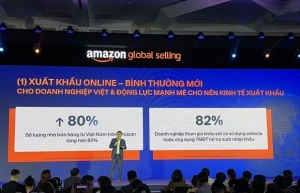Online exports excite e-commerce players
The number of Vietnamese-made buys on Alibaba’s online wholesale platform increased by 47 per cent by the end of the third quarter of this year, according to data released by the platform last week.
Unlike retail e-commerce platforms (B2C), Alibaba’s platform is a wholesale transaction place connecting suppliers with buyers across the globe.
Mike Zhang, country manager of Alibaba in Vietnam said, “I am very optimistic about the development of Vietnam’s cross-border sales internationally. Increased demand contributed to attracting a 24 per cent increase in products from Vietnam to the platform in the first three quarters of the year.”
At the Amazon Cross-border E-commerce Summit in Hanoi in mid-October, Eric Broussard, Amazon’s vice president of International Sales, said that many Vietnamese businesses have joined the company’s community of 2 million selling partners around the world, with the export value of goods increasing by 50 per cent over the past year.
 |
“Vietnam is an emerging part of the global e-commerce supply chain. We value its manufacturing strength, entrepreneurial spirit, and rapid digital transformation. That’s why we are enhancing our presence in Vietnam and will continue to accelerate your success with us,” Broussard said.
Beside Amazon, nearly 900 Vietnamese businesses are taking advantage of the strong growth of cross-border e-commerce to exploit export potential, especially small- and medium-sized enterprises (SMEs), according to the Ministry of Industry and Trade.
Despite accounting for only about 1 per cent of Vietnam’s total export turnover, e-commerce exports still have a lot of potential for development because Vietnam is one of the three countries with the strongest e-commerce growth in Southeast Asia, with an average growth of about 20 per cent per year.
Last year, B2C e-commerce exports ranked seventh among Vietnam’s export categories, reaching a value of $3.5 billion. B2C e-commerce exports can contribute significantly to the local economy, with potential e-commerce export revenues rising to $12.8 billion by 2027, according to research on seizing export opportunities via e-commerce in Vietnam by Access Partnership last year.
The research found that 86 per cent of SMEs believe that they would be unable to export without e-commerce. Vietnamese SMEs plan to take advantage of e-commerce to access more international markets including the United States, China, Japan, and the European Union in the next five years.
Not only does it directly impact the business performance of SMEs, e-commerce also opens up export opportunities to demanding markets for even large enterprises.
Stationary group Thien Long Group, with more than 40 years of development and export experience to nearly 70 different markets, is also among the beneficiaries.
CEO Tran Phuong Nga said that it was not until early 2023 that it decided to participate in selling on Amazon, when it wanted to find a solution to export goods to highly demanding markets like North America.
“This strategic goal allows us to reach international consumers and establish a global presence while fostering a dynamic business model that aligns with our long-term vision and global development efforts,” Nga added.
Although Thien Long Group has encountered challenges in licensing, requirements, and certifications on the safety and greenness of products when exporting online through e-commerce, Nga said that when businesses meet the demanding requirements from foreign markets, it will be easier to access the domestic market.
Despite its rapid growth, online export activities and e-commerce in general are also revealing unsustainable factors, especially negative impacts on the environment.
E-commerce packaging is currently generating the largest amount of waste in the entire industry, six times higher than the amount of waste thrown away when shopping in-store, according to statistics from Shorr Packaging Group.
Meanwhile, the EU will see a further 19 per cent increase in packaging waste by 2030, and for plastic packaging waste even a 46 per cent increase if e-commerce platforms do not comply with green goals.
Nguyen Thanh Hung from the Senior Advisory Council on E-commerce, under the Vietnam E-commerce Association, said that it is time for the country to issue policies to promote e-commerce development in a sustainable and environmentally friendly way.
“Online consumers, as well as e-commerce and logistics businesses, must be the core force implementing solutions that promote sustainability,” he stated.
Currently, a number of businesses in the e-commerce sector have implemented many creative solutions to reduce negative impacts on the environment, including initiatives related to reducing the number of cardboard boxes, switching to recycled packaging, and reducing plastic waste.
Lazada Logistics Vietnam, for example, has used an automatic packaging size determination system to reduce waste in the packaging. The business also utilises Forest Stewardship Council certified packaging or reusing cardboard boxes as dunnage material.
Meanwhile, head of strategy and branding depart Vietnam Post Corporation Phan Trong Le shared that transportation costs currently account for more than 60 per cent of logistics costs.
“Optimisation helps not only reduce costs, but also significantly reduces emissions from e-commerce delivery. Therefore, we pay attention to the process of product recall, return of goods, utilisation of recycled materials, and recovery of scrap from packaging and transportation materials,” he said.
| Lai Viet Anh, Deputy general director Vietnam E-commerce and Digital Economy Agency Ministry of Industry and Trade
Vietnam has soon had policies to support businesses in applying and developing e-commerce, with one of the main goals being to expand distribution channels for Vietnamese goods through e-commerce platforms, promoting cross-border transactions. However, Vietnamese businesses need skills to exploit and apply e-commerce effectively and have more financial support. In the overall plan for e-commerce development, the Ministry of Industry and Trade also offers solutions on training, improving skills, and equipping tools to support businesses in digital transformation and bringing business models to online platforms, especially SMEs. Decision No.1415/QD-TTg, motivating enterprises to directly participate in foreign distribution networks by 2030, encourages businesses to apply e-commerce as a core solution to directly participate in the global distribution network. The decision sets the goal of supporting 5,000 businesses to build capacity to participate in cross-border e-commerce. Meanwhile, Decree No.80/2021/ND-CP also proposes many practical solutions to support many businesses, especially SMEs, to digitally transform and participate in e-commerce, such as 50 per cent support for joining and maintaining e-commerce stores at home and abroad. E-commerce has helped many businesses overcome export barriers, access new and potential markets, and reduce pressure on investment costs. We also work with major e-commerce platforms to provide businesses with knowledge close to business practices, offering initial incentives to encourage them. Gijae Seong, Head of Global Selling Vietnam Amazon
Conventional business-to-business exports are facing some challenges due to the global economic situation, but business-to-consumer retail exports are set to grow into the future, especially in e-commerce. In recent years, Vietnamese businesses have had higher awareness, reflected in the growth in quantity and quality of sellers and export value through Amazon. The export value of Vietnamese businesses selling on Amazon in the 12 months ending August 31 this year increased by 50 per cent. The number of selling partners here joining Amazon increased by 40 per cent. We also regularly receive questions about expanding our business product portfolio, branding, and sustainable growth. All businesses on e-commerce can face common difficulties if they do not have a mature understanding of international customer tastes. Vietnamese businesses often bring the best-selling products in the domestic market abroad. Many businesses failed to dig deep enough on international customer needs, but are too impatient for long-term success. When participating in international business, businesses need to build a long-term development roadmap. In previous years, our biggest goal was to raise businesses’ awareness of e-commerce business models and opportunities. This year, the Amazon team will train sellers how to build sales plans on Amazon and learn about tools and programmes, thereby supporting businesses to increase their competitiveness and chances of success on the new playing field. We believe that the combination of Vietnam’s unique local products and global vision will be the winning formula in today’s competitive market. |
 | E-commerce boosted to fuel sale of Vietnamese goods The internet economy of Vietnam posted the fastest growth in Southeast Asia, from 18 billion USD in 2021 to 23 billion USD in 2022, according to a recent report on regional economies. |
 | E-commerce tax compliance required Local authorities have announced intentions to reinforce tax declarations and payments, as numerous e-commerce platforms have been found to provide inadequate tax information. |
 | Logistics landscape changing through e-commerce overhaul The promising e-commerce sector in Vietnam, which has seen exponential growth and is projected to surpass regional counterparts such as Thailand, Philippines, Malaysia, and Singapore, has had a profound impact on the logistics industry. |
What the stars mean:
★ Poor ★ ★ Promising ★★★ Good ★★★★ Very good ★★★★★ Exceptional
 Tag:
Tag:
Related Contents
Latest News
More News
- Ho Chi Minh City launches plan for innovation and digital transformation (February 25, 2026 | 09:00)
- Vietnam sets ambitious dairy growth targets (February 24, 2026 | 18:00)
- Masan Consumer names new deputy CEO to drive foods and beverages growth (February 23, 2026 | 20:52)
- Myriad risks ahead, but ones Vietnam can confront (February 20, 2026 | 15:02)
- Vietnam making the leap into AI and semiconductors (February 20, 2026 | 09:37)
- Funding must be activated for semiconductor success (February 20, 2026 | 09:20)
- Resilience as new benchmark for smarter infrastructure (February 19, 2026 | 20:35)
- A golden time to shine within ASEAN (February 19, 2026 | 20:22)
- Vietnam’s pivotal year for advancing sustainability (February 19, 2026 | 08:44)
- Strengthening the core role of industry and trade (February 19, 2026 | 08:35)
























 Mobile Version
Mobile Version